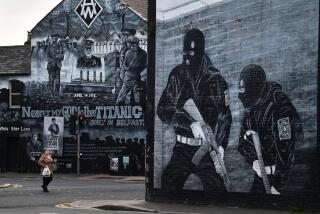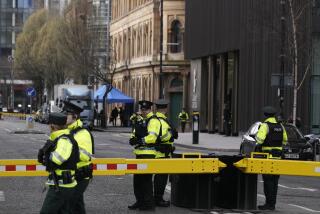Britain Vs. Ireland
- Share via
The governments of Britain and Ireland long have been at odds over Dublin’s reluctance to extradite suspects sought for trial in connection with the Irish Republican Army’s violent campaign to drive the British from Northern Ireland. But the latest extradition dispute--over Patrick Ryan, a former Roman Catholic priest suspected in Britain of supplying money and explosives to the IRA--has strained the relationship and inspired demands in the British Parliament for a reassessment of the 1985 agreement that gives Dublin a voice in Northern Ireland’s affairs.
In denying Britain’s request for Ryan, Irish Atty. Gen. John Murray said that his chances of receiving a fair trial in Britain had been “irredeemably” prejudiced by attacks on him in the British press and intemperate statements by members of Parliament. Murray’s concern was understandable: One newspaper reported, based on a government leak, that Ryan was implicated in a 1982 Hyde Park bombing that killed four soldiers, though he has not been charged with that crime; another tabloid dubbed the ex-priest, once a member of the Pallottine order, “the devil in a dog collar.” Murray may also have been swayed by Britain’s less-than-scrupulous treatment of other IRA suspects; Britain recently was rebuked by the European Court on Human Rights for detaining IRA suspects without filing criminal charges.
Ireland, for its part, too often seems unwilling to antagonize the IRA and too quick to find defects in Britain’s extradition requests; of the 17 suspects whom London has asked Dublin to extradite in the past year, only four have been sent. For five months, while the two governments wrangled, no extradition requests were granted. Earlier this month the Irish parliament voted by a wide margin to make its 1987 extradition legislation permanent; that law requires the attorney general to review each British request and ensure that the authorities intend to prosecute, not simply question, the suspect and have sufficient evidence. But, normally, the attorney general is not supposed to consider whether the suspect’s right to a fair trial has been prejudiced by pretrial publicity--the ground cited for denying Ryan’s extradition.
These conflicts over extradition are likely to recur until Britain and Ireland establish standards that both governments fully support. Extradition works best when it is largely a mechanical process. Prime Minister Margaret Thatcher pointed out last week that the Irish agreed to reassess their extradition agreement with the British “if it was not working satisfactorily--and it is not--so we shall call that promise in for them to honor”; that can be done as part of the scheduled review of the 1985 Northern Ireland pact. In the meantime, there is a way to solve the conflict over Patrick Ryan. Ireland could prosecute him under a 1976 law that allows British and Irish suspects to be tried in one country for crimes committed in the other. The Irish attorney general, conceding that the accusations against Ryan are “of a most serious kind,” seems willing to try Ryan. The reservations come from Thatcher, who expressed concern about the security of any British witnesses called to testify in Ireland. So now it is really up to Thatcher to decide whether Ryan will ever be brought to justice.
More to Read
Sign up for Essential California
The most important California stories and recommendations in your inbox every morning.
You may occasionally receive promotional content from the Los Angeles Times.













